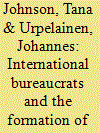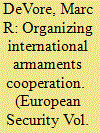| Srl | Item |
| 1 |
ID:
131489


|
|
|
|
|
| Publication |
2014.
|
| Summary/Abstract |
Bureaucrats working in international intergovernmental organizations (IGOs) regularly help states design new IGOs. Sometimes international bureaucrats possess limited discretion in institutional design; sometimes, they enjoy broad discretion. In fact, they gain discretion even when they openly oppose state preferences. This contravenes conventional thinking about delegation: discretion should decrease as preference divergence between states and international bureaucrats increases. We develop a principal-agent theory of how much discretion states grant to international bureaucrats in the design of new IGOs. This is novel: while principal-agent theories of international delegation are common, scholars have not analyzed principal-agent relationships in the creation of new IGOs. We argue that even an international bureaucracy that disagrees with states' design preferences may enjoy substantial design leeway, because of states' need for bureaucratic expertise. In developing this argument, we employ a formal principal-agent model, case studies, and an original data set.
|
|
|
|
|
|
|
|
|
|
|
|
|
|
|
|
| 2 |
ID:
028632


|
|
|
|
|
| Edition |
2nd ed.
|
| Publication |
Chicago, University of Chicago Press, 1964.
|
| Description |
xiv, 434pHbk
|
|
|
|
|
|
|
|
|
|
|
|
Copies: C:1/I:0,R:0,Q:0
Circulation
| Accession# | Call# | Current Location | Status | Policy | Location |
| 002811 | 658.409/LEA 002811 | Main | On Shelf | General | |
|
|
|
|
| 3 |
ID:
114215


|
|
|
|
|
| Publication |
2012.
|
| Summary/Abstract |
Few issues are more important to scholars of Europe's emergence as a foreign policy actor than whether the European Union (EU) can forge a common defense-industrial policy out of 27 states' procurement policies and defense industries. Overlooked in most scholarly analyses of European defense-industrial cooperation, the story of Europe's international armaments organizations stretches back more than six decades. In this article, we examine the impact of past institutional outcomes on the defense-industrial field by applying the concepts and analytic tools of historic institutionalism to European armaments organizations. Because past institutional dynamics have channeled the subsequent development of armaments cooperation, what has emerged is a polycentric governance architecture wherein organizations with transatlantic, pan-European and restrictive-European memberships dominate distinct components of the cooperative process. We demonstrate that this maturing institutional pattern will likely limit the opportunities for the EU - and especially its Commission - to shape the future contours of European defense-industrial cooperation.
|
|
|
|
|
|
|
|
|
|
|
|
|
|
|
|
| 4 |
ID:
105725


|
|
|
|
|
| Publication |
2011.
|
| Summary/Abstract |
President Obama has called for the development of new energy technologies to address our national energy needs and restore US economic competitiveness. In response, the Department of Energy has established new R&D modalities for energy research and development designed to facilitate collaboration across disciplinary, institutional, and sectoral boundaries. In this research note, we provide a preliminary assessment of the potential for essential mechanisms for coordinated problem solving among diverse actors within two new modalities at the DOE: Energy Innovation Hubs and Energy Frontier Research Centers.
|
|
|
|
|
|
|
|
|
|
|
|
|
|
|
|